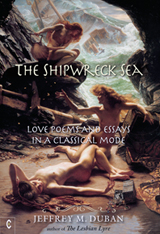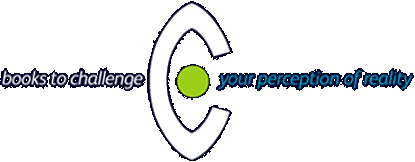
Sappho, in the words of poet Algernon Charles Swinburne (1837–1909), was “simply nothing less – as she is certainly nothing more – than the greatest poet who ever was at all.” Born over 2,600 years ago on the Greek island of Lesbos, Sappho, the namesake lesbian, wrote amorously of men and women alike, exhibiting both masculine and feminine tendencies in her poetry and life. What’s left of her writing, and what we know of her, is fragmentary, and thus ever subject to speculation and study.
The Shipwreck Sea highlights the love poetry of the soulful Sappho, the impassioned Ibycus, and the playful Anacreon, among other Greek lyric poets of the age (7th to 5th centuries BC), with verse translations into English by author Jeffrey Duban. The book also features selected Latin poets who wrote on erotic themes – Catullus, Lucretius, Horace, and Petronius – and poems by Charles Baudelaire, with his milestone rejoinder to lesbian love (“Lesbos”) and, in the same stanzaic meter, a turn to the consoling power of memory in love’s more frequently tormented recall (“Le Balcon”). Duban also translates selected Carmina Burana of Carl Orff, the poems frequently Anacreontic in spirit.
The book’s essays include a comprehensive analysis with a new translation of Horace’s famed Odes 1.5 (“To Pyrrha”), in which the theme of (love’s) shipwreck predominates, and an opening treatise-length argument – exploring painting, sculpture, literature, and other Western art forms – on the irrelevance of gender to artistic creation. (No, Homer was not a woman, and it would make no difference if she were.) Twenty full-color artwork reproductions, masterpieces in their own right, illustrate and bring Duban’s argument to life.
Finally, Duban presents a selection of his own love poems, imitations and pastiches written over a lifetime – these composed in the “classical mode”, which is the leitmotif of this volume. The Shipwreck Sea is a delightful and continually thought-provoking companion to The Lesbian Lyre, both books vividly demonstrating that classicism yet thrives in our time, despite the modernism marshaled against it.
“There are few scholars who possess the innate ability to translate ancient Greek poetry into fittingly refined English. Jeffrey Duban, in The Shipwreck Sea, masterfully encapsulates all that is Greek poetry – language, inflection, ethos, drama.” – Constantinos Yiannoudes, Founder and Director, Kyrenia Opera
“Jeffrey Duban wears his profound knowledge of the ancient world and its languages less as erudition, more as immediate breathing presence of deeply rooted instinct and resonant cultural descent. Whether as translator of Sappho, Horace, and others, or as poet in his own right, his work lyrically and evocatively fulfills the urgent need of our souls for affirmation of whence we come.” – Christopher Lyndon-Gee, Composer, Conductor, and Author, New York & Vilnius
JEFFREY DUBAN attended the Boston Public Latin School, where he studied Latin, Greek, and French throughout. Majoring in classics at Brown, he also attended the Hebrew University of Jerusalem, where he studied not only classics, but Sanskrit and the Hebrew Old Testament. He obtained his Ph.D. from Johns Hopkins, briefly entering upon university teaching, but later entered law school, earning his JD from Fordham. As an attorney, he specialized in academic law, representing faculty in promotion and tenure cases, and faculty and students in disciplinary proceedings. In 2016, he published The Lesbian Lyre: Reclaiming Sappho for the 21st Century, a far-ranging volume described as “a humanities degree between two covers”. The Lesbian Lyre was the inspiration for the author’s musical program, in which he serves as narrator, of Sir Granville Bantock’s Sappho: Nine Fragments for Contralto. Duban is also presently collaborating with Greek-Canadian composer Constantine Caravassilis.
Published in the UK by Clairview Books, 28 January 2019
£20.00; 368pp + 12pp colour plates; 23.5 x 15.5 cm; hardback; ISBN 9781912992003
